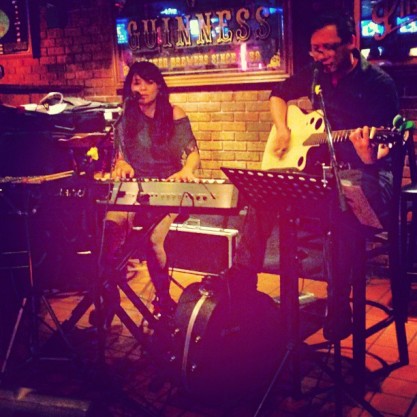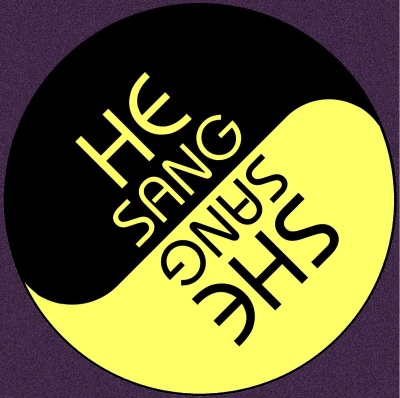
In the Philippines where both Bronne and I are from, I’m pretty sure open mics didn’t exist. I knew of stand-up open mics because of TV, but I’ve never heard of music ones until I saw a rerun of “The Thing Called Love” (so-so movie, but opened my eyes to the existence of open mics for musicians). So when we moved to the US and ventured on our very first 6 years ago, at Marshall Still’s open mic at an Irish pub whose name I can no longer remember, we learned how it worked and how to behave through observation. We hit up an open mic everyday of that week and quickly learned that there’s a general open mic etiquette, and there’s one that was unique to a venue, that were, maybe intentionally or unwittingly on their part, propagated by the hosts. We noticed that musicians often take their cue on how to behave from the people running the open mic. We were lucky that at that first week, we met some good ones. They:
- were welcoming
- encouraged listening from both musicians and the audience
- applauded for all acts
- introduced musicians to each other
- showed an interest, etc.
But through the years, we’ve encountered nonchalant hosts that
- weren’t helpful, were there to just earn their keep
- didn’t cultivate a sense of community, didn’t support
- were rude
- that cut sound off unceremoniously when he didn’t like the singer
- were on their phones the whole night
- disappeared and so the open mic-ers had to figure out the PA
- were too drunk to function
Through the years, these are some of the things we’ve learned to be mindful of when participating at open mics. We practice them as part of getting better at what we do. Warning: there will be a lot of “we’ and “us” words on this list simply because these are all based on our experience.
1. You’ve heard of eat-and-run? Try not to do the open mic version of that: play-and-run. Some musicians play then leave to go to try another open mic. As much as we support honing ones craft through live performance, that’s just a facet of the whole experience. Here’s how I see it: you know those people that talk and talk then leave when it’s your turn to speak? It’s like that. Play-and-runners may have their reasons for leaving early. I think we’ve done that a handful of times in our 6 years of doing open mics. But we’ve met ones who do it regularly, and it’s obvious they don’t care about what others have to share. If you’re out to get better, don’t play-and-run. Listening is essential to growth, not just in music, but in life. So stay. Commit to one venue and learn. Observe what makes a good performer good, and think of what could make the bad ones better. Make friends. Support the other participants by listening to their music.
2. Be brave. Try out a new song even if it scares you. Why do the same 3 or 4 songs every week? Are those the crowd favorites and you want to please? Are those the songs at which you excel so you know you’ll deliver them well? These are good reasons to keep doing them. But you can only get better doing one thing to an extent. Think of physical exercise. First you struggle then your body gets better at doing it after which you’re a well-oiled machine. And then what happens? You plateau. You need to change things up or add something new to continue your physical growth. It’s the same with performing at open mics. You don’t even have to change the songs. Just don’t do them exactly the same way each time. Arrange them differently. Have another player (with whom you made friends because you didn’t play-and-run) accompany you or sing harmony. Change it up if you want to grow.
3. Network. If you’re a newbie, and everyone once was, and you’re trying to gather enough material for a full gig, then this is where to do it. At an open mic, you get to meet people you can team up with to complete a 3-hour gig. We know musicians that do something like “Ballad Brian and Friends” (true person with real friends!). They do short individual sets and often play together for a few songs. They help each other out and have fun doing it. If you’re good at singing or at playing an instrument, you can connect with a band needing your talents. You never know, but a certain open mic night could be an audition for you without the anxiety of a real scheduled try-out. Or just make new friends. 🙂 We’ve met some of our very good ones from open mics.
4. Really ask for feedback. Don’t settle for “You’re awesome!” and believe it without question. We’ve been to open mics where, after we play, people tell us we were “awesome”. Then we stay and listen to, say, an out-of-tune singer do his set, and guess what? He’s awesome, too, according to the crowd. We’ve heard people complain about or ridicule an open mic-er during his set, then turn around and say, “That was f*ckin’ great, man!” after he’s done. My point is this: courtesy is not feedback, and positive comments, I’m sad to say, are not always sincerely meant. If you want to grow, you want to know what people see and hear during your performance, things you can improve upon. These are not always nice to hear. They can sometimes hurt. Who wants to hear that you’re a grouchy performer, or that your P’s explode into the mic and irritate the hell out of people? I don’t. But I had to hear them so I could change. 🙂
5. If asking for real feedback, don’t go all cranky when they give it. Like I mentioned above, they are not all pleasant. But if you ask for it, be prepared to really hear it. Then do some discerning. Did they comment on your performance or your music? Did they say, “We couldn’t hear your vocals that well because you kept looking down at your guitar”? Then that’s good feedback because it’s something you can change! But if they say, “All your songs are gloomy. Why don’t you play something happy now and then?” That’s a preference thing. If gloomy music is what truly emanates from you, then don’t change. But you just learned a lesson that not everyone will like what you write. So, though it’s not wasted feedback, you don’t always have to change to please people. You can’t please everyone.
Just like in anything in life, the more you practice, the better you become. Being brave, asking for feedback and accepting them with grace, networking, and staying put in one venue are behaviors you can learn. A couple of things on this list, I can do easily; I’m still working on the others. But we all go through stages. Maybe now you’re focusing more on getting through 3 songs without falling apart; after you get better at that, maybe then you can start getting better at networking. That was my route. I had stage fright and get very anxious in social situations. I found the former easier to get over than the latter. In truth, I’m still trying to conquer it.
Do you have anything to add to the list above? Do you agree or disagree with anything I wrote, or are offended by it? Share! I’d love to hear your thoughts, my friends. 🙂
–She Sang

What a great blog! One thing I would add is, if you are up on stage with other musicians, be sure to know the key you sing the song in (if you are a singer and not playing an instrument), and if it is a song others are not familiar with, be sure to walk all of your stage mates through the basics of the song before starting it up. Your performance will be great enhanced by your supporting musicians if you do that.
LikeLiked by 1 person
I wondered about jams. People come up to play and usually everybody just starts playing like they know the songs.But sometimes it turns bad because some people don’t know the song or know it in a different key. But I don’t see them discussing anything before or when they go up on stage. Maybe some are embarrassed to admit they don’t know the chords and just try to wing it. Or some don’t speak the same musical language and terms like I-IV-V etc sound Greek to them but won’t admit it. I don’t know if these people should be less proud, or a more encouraging atmosphere could be cultivated by the older players or hosts. 🙂
Thanks, Dana! 😀
LikeLike
You know, that is actually a good point, and I think I will start saying something to that effect at the beginning of the night and maybe halfway through as well…”just a reminder when you come up on stage to check with everyone about the song you want to play and make sure they know what you are going to do and if they don’t, take a sec to walk them through it”. Thanks for the suggestion!
LikeLiked by 1 person
That would help a great deal, Dana. It will make newbies feel more welcome, too. 🙂
LikeLike
These inputs I feel are so applicable and right on!! Thanks for being down-to-earth and enlightening!!!!
Jimmie Stingley
Open Mic Bass Player Trainee
LikeLike
Thank you, Jimmie! We wish you happy and fruitful open mic adventures!
LikeLike